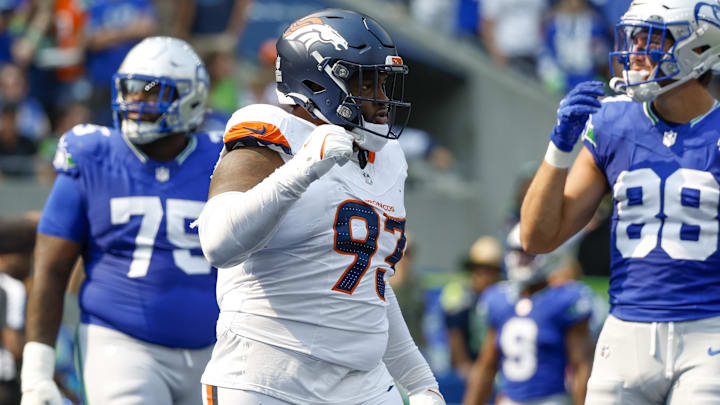How Broncos can Compensate for the Lack of a True Nose Tackle

In this story:
The Denver Broncos have a talented defensive front, a unit that was rated as the NFL's eighth-best by Pro Football Focus. Whether you agree or think the Broncos should be ranked a few spots higher, the point is that it's a talented unit.
That ranking is also an improvement for the unit. PFF had Denver's defensive front at 31st entering the 2024 season. However, despite now having depth and quality, the Broncos still have some concerns.
The Broncos lack a true nose tackle. Sure, they have D.J. Jones and Malcolm Roach, but neither is a true nose tackle. A bona fide nose tackle in a 3-4 scheme is a 330-plus-pound behemoth who can two-gap and hold up against double teams. While Jones is a quality run defender and the better of the two players, he doesn't tip the scales north of 330 pounds, struggles to two-gap, and has difficulty against double teams.
A Top-3 Run Defense
This is not meant to diminish Jones, as he did well last year. There's a reason the Broncos re-signed him, but there are limitations to his game.
Despite them, the Broncos still had a top-ranked run defense last year, with the exception of a few games, due to how they compensated for the lack of a proper nose tackle. It's how they showed their hand to an extent, but there can still be more tricks up Denver's sleeve.
Run defense is a true collective pursuit, as one player blowing their assignment or gap integrity can lead to a big play. In those poor games as a run defense, most of the Broncos' issues could be attributed to such lapses.
The linebackers filled in terribly, or a safety, and the Broncos made moves to improve those areas. That could help take some pressure off the defensive line, and in so doing, help cover the issues created by not having that true nose.
Lean into Versatility
Another way is by the Broncos using their defensive front players in a versatile way. When the front players are being outclassed, as in the Wildcard Round of the playoffs, the Broncos now have more options available to them.
Last year, the Broncos couldn’t use John Franklin-Myers as an edge player because Jordan Jackson was unreliable. The defense was better off keeping Nik Bonitto or Jonathon Cooper on the field, despite the former being a bad run defender and the latter being maddeningly inconsistent.
This year, the Broncos can move Franklin-Myers around, especially if Sai’Vion Jones hits. Both Jones and Franklin-Myers possess the versatility to line up as an edge, so if the Broncos struggle against the run, that could positively impact their defensive front overall. This can allow the team to use fronts with Jones, Roach, D.J. Jones, Allen, and Franklin-Myers as their five-guy line in obvious running situations or when they're being bullied defensively.
Sure, the Broncos take a hit to their pass-rushing prowess any time Bonitto and Cooper aren't on the field, but the secondary should be able to hold up well enough, and Franklin-Myers and Allen can carry the brunt of the weight as pass rushers if they get caught in that front. Plus, Sai’Vion Jones has plenty of potential there.
The Takeaway
Even though the Broncos lack a true nose tackle, they still have a lot going for them to be an improved run defense from last year, despite allowing the third-fewest yards in the NFL. However, that ranking is helped by Denver's season finale against the Kansas City Chiefs, where they allowed 27 rushing yards.
Recommended Articles
The Broncos allowed over 100 yards in nine games, including the 210 yards allowed to the Buffalo Bills in the playoffs. Clearly, there's room for improvement from the unit, and a true nose tackle could help, but the Broncos have the avenues to cover for it.
Join the most outspoken fanbase in Denver Broncos land by connecting with Denver Broncos On SI/Mile High Huddle on Instagram, X, and Facebook, and subscribe on YouTube for daily live-stream podcasts!

Erick Trickel is the Senior Draft Analyst for Mile High Huddle, has covered the Denver Broncos, NFL, and NFL Draft for the site since 2014.
Follow ErickTrickel